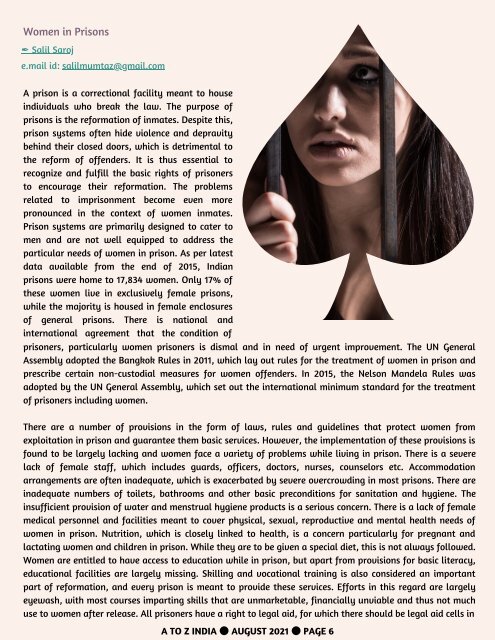A TO Z INDIA - AUGUST 2021
FROM THE EDITOR'S DESK: INDEPENDENCE DAY 2021 - On this day, the national flag of India is hoisted at multiple public places; Prime Minister unfurls the national flag at Red Fort in Delhi to commemorate this historical event. Along with the flag-hoisting ceremony, parade and folk-dance performances also take place. Multiple festivities take place in different parts of the nation. WOMEN IN PRISONS - Prison systems often hide violence and depravity behind their closed doors, which is detrimental to the reform of offenders. AFGHAN POLITICAL LEADER:ABDUL GHAFFAR KHAN - Khan Abdul Gaffar Khan was known as Badshah Khan and “Sarhadi Gandhi” and Frontier Gandhi. He was born in 1890and Died on January 1988.
FROM THE EDITOR'S DESK: INDEPENDENCE DAY 2021 - On this day, the national flag of India is hoisted at multiple public places; Prime Minister unfurls the national flag at Red Fort in Delhi to commemorate this historical event. Along with the flag-hoisting ceremony, parade and folk-dance performances also take place. Multiple festivities take place in different parts of the nation.
WOMEN IN PRISONS - Prison systems often hide violence and depravity behind their closed doors, which is detrimental to the reform of offenders.
AFGHAN POLITICAL LEADER:ABDUL GHAFFAR KHAN - Khan Abdul Gaffar Khan was known as Badshah Khan and “Sarhadi Gandhi” and Frontier Gandhi. He was born in 1890and Died on January 1988.
- No tags were found...
You also want an ePaper? Increase the reach of your titles
YUMPU automatically turns print PDFs into web optimized ePapers that Google loves.
Women in Prisons<br />
✒ Salil Saroj<br />
e.mail id: salilmumtaz@gmail.com<br />
A prison is a correctional facility meant to house<br />
individuals who break the law. The purpose of<br />
prisons is the reformation of inmates. Despite this,<br />
prison systems often hide violence and depravity<br />
behind their closed doors, which is detrimental to<br />
the reform of offenders. It is thus essential to<br />
recognize and fulfill the basic rights of prisoners<br />
to encourage their reformation. The problems<br />
related to imprisonment become even more<br />
pronounced in the context of women inmates.<br />
Prison systems are primarily designed to cater to<br />
men and are not well equipped to address the<br />
particular needs of women in prison. As per latest<br />
data available from the end of 2015, Indian<br />
prisons were home to 17,834 women. Only 17% of<br />
these women live in exclusively female prisons,<br />
while the majority is housed in female enclosures<br />
of general prisons. There is national and<br />
international agreement that the condition of<br />
prisoners, particularly women prisoners is dismal and in need of urgent improvement. The UN General<br />
Assembly adopted the Bangkok Rules in 2011, which lay out rules for the treatment of women in prison and<br />
prescribe certain non-custodial measures for women offenders. In 2015, the Nelson Mandela Rules was<br />
adopted by the UN General Assembly, which set out the international minimum standard for the treatment<br />
of prisoners including women.<br />
There are a number of provisions in the form of laws, rules and guidelines that protect women from<br />
exploitation in prison and guarantee them basic services. However, the implementation of these provisions is<br />
found to be largely lacking and women face a variety of problems while living in prison. There is a severe<br />
lack of female staff, which includes guards, officers, doctors, nurses, counselors etc. Accommodation<br />
arrangements are often inadequate, which is exacerbated by severe overcrowding in most prisons. There are<br />
inadequate numbers of toilets, bathrooms and other basic preconditions for sanitation and hygiene. The<br />
insufficient provision of water and menstrual hygiene products is a serious concern. There is a lack of female<br />
medical personnel and facilities meant to cover physical, sexual, reproductive and mental health needs of<br />
women in prison. Nutrition, which is closely linked to health, is a concern particularly for pregnant and<br />
lactating women and children in prison. While they are to be given a special diet, this is not always followed.<br />
Women are entitled to have access to education while in prison, but apart from provisions for basic literacy,<br />
educational facilities are largely missing. Skilling and vocational training is also considered an important<br />
part of reformation, and every prison is meant to provide these services. Efforts in this regard are largely<br />
eyewash, with most courses imparting skills that are unmarketable, financially unviable and thus not much<br />
use to women after release. All prisoners have a right to legal aid, for which there should be legal aid cells in<br />
A <strong>TO</strong> Z <strong>INDIA</strong> ● <strong>AUGUST</strong> <strong>2021</strong> ● PAGE 6















